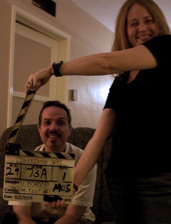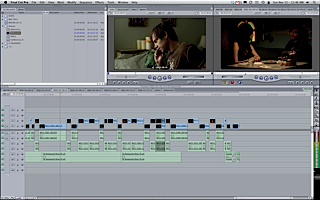spoiler
“What kind of movie is it?”
 A simple question, best answered simply. In describing Darkening Sky, “A horror/thriller with elements of sci-fi” comes close, and seems to be the approach being taken in marketing the film. But I prefer, “A psychological thriller wrapped in a story about alien abduction.” A bit narrower, yes, but more accurate. Darkening Sky actually has more in common with Shutter Island or Black Swan than, say, Communion or Fire In The Sky (or more recently, The Fourth Kind). Yes, there are wild UFO theories, and even aliens, but to call it a movie about alien abduction would be like calling Black Swan a movie about ballet. (Ahem: spoiler alert?)
A simple question, best answered simply. In describing Darkening Sky, “A horror/thriller with elements of sci-fi” comes close, and seems to be the approach being taken in marketing the film. But I prefer, “A psychological thriller wrapped in a story about alien abduction.” A bit narrower, yes, but more accurate. Darkening Sky actually has more in common with Shutter Island or Black Swan than, say, Communion or Fire In The Sky (or more recently, The Fourth Kind). Yes, there are wild UFO theories, and even aliens, but to call it a movie about alien abduction would be like calling Black Swan a movie about ballet. (Ahem: spoiler alert?)
Darkening Sky was conceived with the idea that people who do horrible things usually don’t regard themselves as horrible. For them, their actions and responses might seem perfectly reasonable. Or at least defensible, given the circumstances. So, what if a man obsessed with proving something false (i.e., alien abduction) was forced to deal with circumstances that left no other possible explanation? And what if that obsession was a bit more — let’s say, “complicated” — than he is letting on? That sounded like fun to me! And that’s the story I tried to tell.
 Which brings us to the problem of Expectations. Mixing genres is all well and good, but once a film is released to the wild for viewing by everyone, it introduces the potential problem of building anticipation for one thing, but delivering something else. Managing expectations is of course easier when millions of dollars are being thrown at marketing. But a little indie film might understandably have a tougher time of it. Fair enough. So far, early reviewers of Darkening Sky seem willing to critique the movie on its own merits, which is great. One thoughtful reviewer described it as, “…mixing that genre [ufos] with another which shall remain nameless so that I don’t spoil the movie.” Well put! And no spoiler necessary.
Which brings us to the problem of Expectations. Mixing genres is all well and good, but once a film is released to the wild for viewing by everyone, it introduces the potential problem of building anticipation for one thing, but delivering something else. Managing expectations is of course easier when millions of dollars are being thrown at marketing. But a little indie film might understandably have a tougher time of it. Fair enough. So far, early reviewers of Darkening Sky seem willing to critique the movie on its own merits, which is great. One thoughtful reviewer described it as, “…mixing that genre [ufos] with another which shall remain nameless so that I don’t spoil the movie.” Well put! And no spoiler necessary.













 Okay, so one little running joke throughout this “
Okay, so one little running joke throughout this “ So it must be later in the process. Okay, Final Cut! Not the (awesome)
So it must be later in the process. Okay, Final Cut! Not the (awesome)  Sounds good to me! Well, in that case, we’re only about one month out from me yelling from the rooftops! Figuratively, at least. And who knows, maybe even getting that tattoo. But…of what? The title? Logo? Hm… I know: Maybe it should be a likeness of
Sounds good to me! Well, in that case, we’re only about one month out from me yelling from the rooftops! Figuratively, at least. And who knows, maybe even getting that tattoo. But…of what? The title? Logo? Hm… I know: Maybe it should be a likeness of  Then comes the actual Making a Movie part. Cutting together all those moments, that amazing thing actors do (I am ever more in awe of this particular piece of magic), all those beautifully lit and composed shots your cinematographer fought for (thank god!), all those pickups your scriptie and AD reminded you to get, all that hard work by all those fantastic people… Then, if the stars continue to align with you, voilá: A movie! Easy-peasy.
Then comes the actual Making a Movie part. Cutting together all those moments, that amazing thing actors do (I am ever more in awe of this particular piece of magic), all those beautifully lit and composed shots your cinematographer fought for (thank god!), all those pickups your scriptie and AD reminded you to get, all that hard work by all those fantastic people… Then, if the stars continue to align with you, voilá: A movie! Easy-peasy. There comes a time on the road to artistry when one encounters the Wall Of Suck. That is the wall you hit where your natural ability at something leads you to actually study and practice it, which takes you to the point where you are met with the actual depth and breadth of your incompetence… Suddenly, you suck. Suddenly, it is devastatingly clear that your “natural ability” was just a starting place, a jumping off point on a journey to the place where you might actually get good at something. I call it a wall, because this is where you either give up (turn back) or your workload increases exponentially (i.e., your forward movement becomes a vertical climb). I’ve encountered it a few times in my life; some pursuits presented challenges I could not ignore and proceeded to engage with all my energy, damn the consequences… Others were ultimately revealed as misguided, and I bailed.
There comes a time on the road to artistry when one encounters the Wall Of Suck. That is the wall you hit where your natural ability at something leads you to actually study and practice it, which takes you to the point where you are met with the actual depth and breadth of your incompetence… Suddenly, you suck. Suddenly, it is devastatingly clear that your “natural ability” was just a starting place, a jumping off point on a journey to the place where you might actually get good at something. I call it a wall, because this is where you either give up (turn back) or your workload increases exponentially (i.e., your forward movement becomes a vertical climb). I’ve encountered it a few times in my life; some pursuits presented challenges I could not ignore and proceeded to engage with all my energy, damn the consequences… Others were ultimately revealed as misguided, and I bailed. I think what pushes people up and over the wall is passion, pure and simple. Either this thing truly lights you up and inspires you, or it does not. When it comes down to it, it’s just you and the _____ (guitar, blank canvas, whatever), and no one really gives a shit. If you don’t absolutely love doing it, you will not do the work, and you will continue sucking. The road ahead is arduous, lonely and often boring; frustration is constant (the
I think what pushes people up and over the wall is passion, pure and simple. Either this thing truly lights you up and inspires you, or it does not. When it comes down to it, it’s just you and the _____ (guitar, blank canvas, whatever), and no one really gives a shit. If you don’t absolutely love doing it, you will not do the work, and you will continue sucking. The road ahead is arduous, lonely and often boring; frustration is constant (the 